Educating the next generation of AI researchers.

Artificial intelligence (AI) offers an exciting range of career options, touching on almost every industry.
As these technologies become increasingly integrated into our lives and societies, demand for AI workers is growing exponentially, with skilled graduates typically earning salaries that are much higher than average.
If you are thinking about a career in AI, there are several reasons why the University of Oxford should be top of your list:

World-leading computer science teaching.
The University of Oxford’s Department of Computer Science has been ranked first in the world for six years in a row. It is also one of the longest-running departments dedicated to Computer Science in the world, having originally begun as Oxford University Computing Laboratory in 1957.
According to Professor of Computing Science, Sir Nigel Shadbolt, a key factor behind its success is its world-class excellence in foundational computer science, which underpins all AI technologies.
‘Oxford’s Computer Science Department has always had an extremely strong reputation in theoretical computer science, including mathematical principles, semantics, and programming languages.’
‘This equips our students with the skills needed to interrogate and apply the latest developments in AI and machine learning. As a result, our graduates are in high demand across a wide range of industries. Applications may change, but the fundamentals stay fundamental.’
From human-centred computing and programming languages, to algorithms and complexity theory, students are taught by world leaders in their fields, including Alan Turing Research Fellows. Coupled with Oxford’s distinct tutorial system, this creates an environment where students can rigorously test their understanding and develop new ideas.
‘The tutorial system is extremely important for developing our students' understanding. These challenge students on not just what they know, but how they can apply that knowledge and critically frame arguments’ says Sir Nigel.
‘On top of this, you have the collegiate system, which sees students mixing with peers studying different subjects on a daily basis. In combination, this creates a ripe environment for the constant exchange of ideas.’

Multidisciplinary ethos.
But Oxford’s AI community extends far beyond the Department of Computer Science.
Sir Nigel adds: ‘We have close collaborations with Engineering, Mathematics, Physics, and the Life Sciences. AI research at Oxford is investigating applied uses for a range of industries, including autonomous vehicles, robotics, and medical AI. This allows us to offer our students really innovative projects that apply AI and machine learning in new, cross-disciplinary ways.’
For instance, Olivia Gallup – a final year DPhil (PhD) student in the Department of Engineering Science – is working at the interface of AI and synthetic biology in the Engineered Biotechnologies Research Group, led by Professor Harrison Steel.
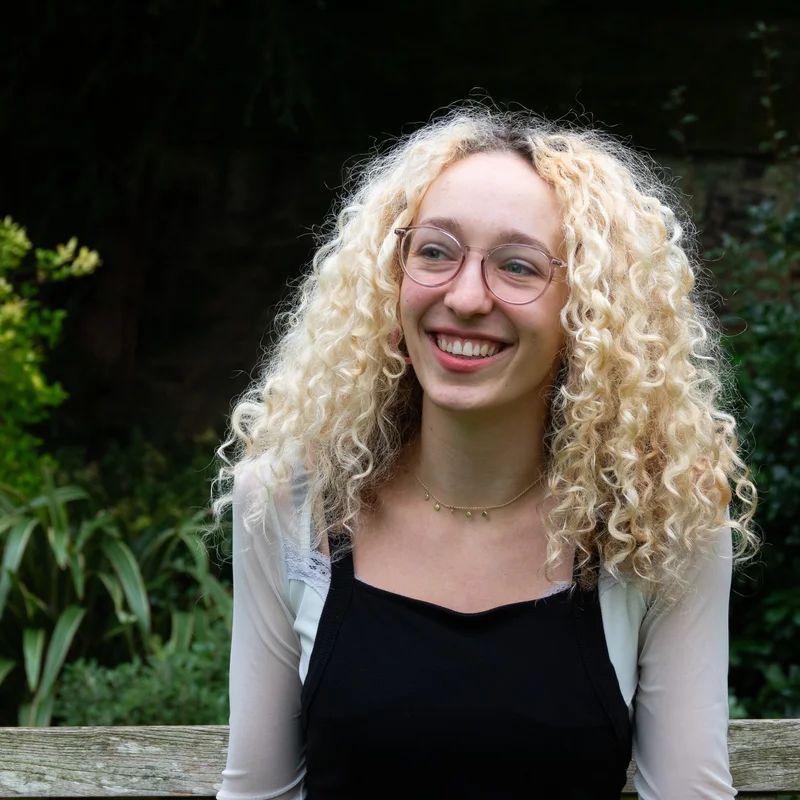
Olivia Gallup, DPhil student
Olivia Gallup, DPhil student
‘My project is researching how to use computational methods to design genetic circuits for cells, using RNA circuits as a model’ she says. ‘This involves using AI-based methods to effectively search through the vast number of potential sequence combinations, and to then run simulations. The goal is to predict what RNA sequences can achieve a certain desired circuit function, for example signal adaptation, while remaining evolutionarily stable.’
‘The project draws on my background in bioengineering – which includes coding, mathematical modelling, and lab work – whilst developing my skills in new areas such as RNA biology, large scale simulation, and machine learning with automatic differentiation frameworks like JAX. Our lab group has a very diverse environment as our members come from a real mix of different backgrounds – including hardware engineers, cell biologists and computer scientists. This opens up really exciting opportunities to collaborate on projects to explore how lab work can be transformed by developing new computational approaches.’
‘Early-career researchers in AI have a lot of opportunities here, particularly for multidisciplinary work.’
‘It isn’t unusual for AI DPhil students to have two supervisors from different lab groups, allowing them to benefit from a wider pool of expertise. Typically, you not only learn necessary AI skills, but also quickly start working on publications and advancing your research portfolio.’
However, new and innovative uses of AI will have profound societal implications. Oxford is a world-leader in researching the ethical, legal and cultural dimensions of AI, particularly through the Oxford Internet Institute and the Institute for Ethics in AI. This is reflected in our teaching offer, with students in AI and computer science hearing from experts in law, regulation, philosophy and social science.
‘We want to make sure our students are not just designing technological solutions but thinking about the values designed into these systems,’ says Sir Nigel.

Strong industry links.
From Google DeepMind and Mind Foundry, to Samsung and the Satellite Catapult, the University of Oxford has close links to a range of AI-related industrial partners. This enables our DPhil students to collaborate on projects to develop applied solutions that can immediately address real-world challenges.
DPhil student Kelsey Doerksen is based in the Oxford Applied and Theoretical Machine Learning Group in the Department of Computer Science, supervised by Yarin Gal and Freddie Kalaitzis. Her work focuses on applying machine learning to leverage satellite and remote sensing data to improve our understanding of Earth systems and developing algorithms to improve models of climate and natural disasters, such as landslides.
‘I have always been passionate to do impactful research, so it is very rewarding to collaborate with organisations who are directly addressing humanitarian and climate needs.’
‘For my DPhil, I am working with the NASA Jet Propulsion Lab to develop new AI methods to improve air pollution models. These would help us better understand the key drivers of pollution and formulate effective policies to address these,’ she says.
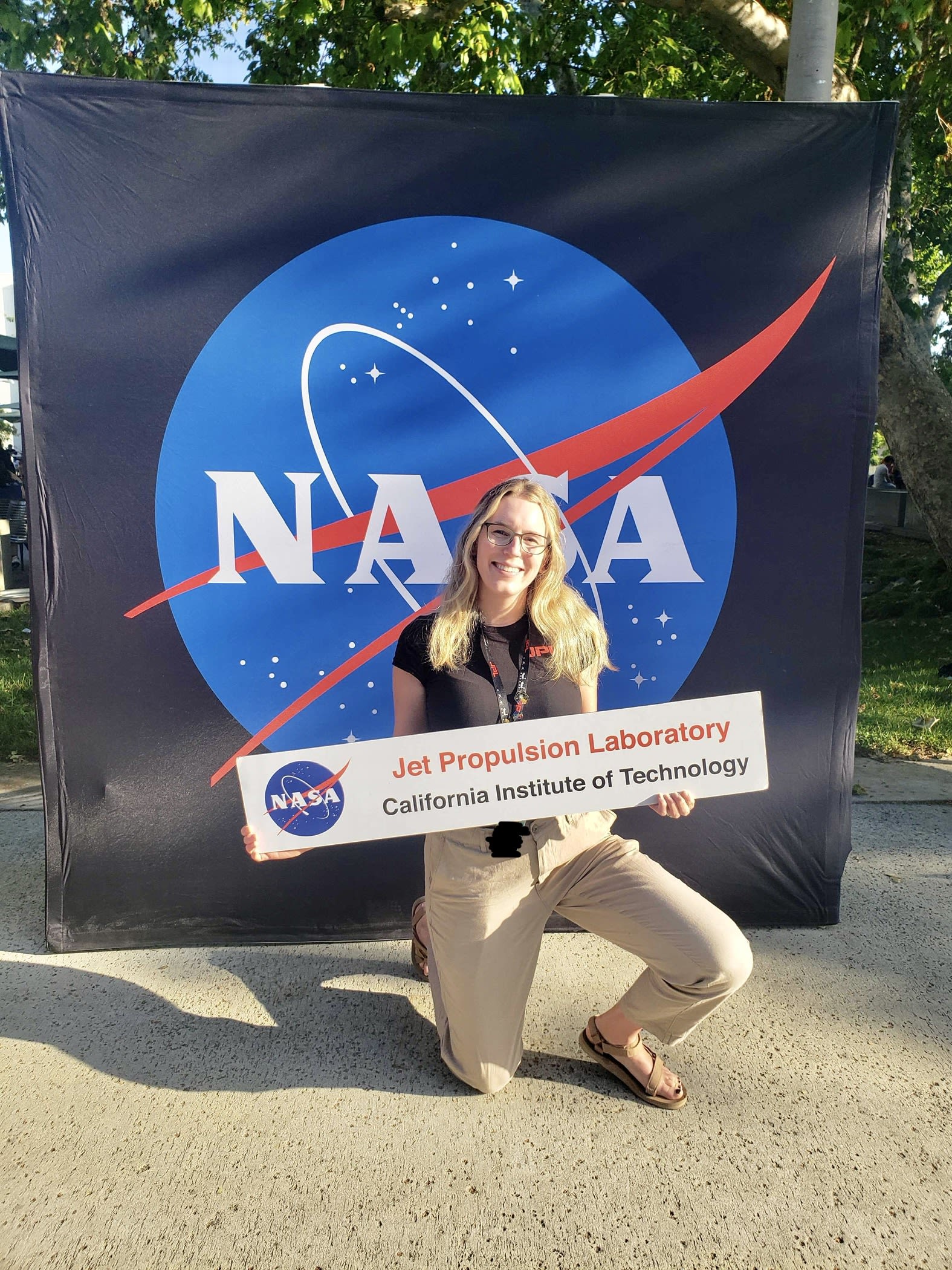
Kelsey Doerksen at the NASA Jet Propulsion Laboratory's Summer Intern event.
Kelsey Doerksen at the NASA Jet Propulsion Laboratory's Summer Intern event.
‘I am also collaborating with UNICEF and the European Space Agency on their Giga initiative, which aims to connect every school in the world to the Internet. My role is to leverage AI and Earth observation data to map internet connectivity to schools and create socio-economic profiles of schools in the Global South. Ultimately, this will help UNICEF and Governments to effectively build infrastructure to connect every child to the internet.’
‘Finally, I am working on a project supported by Deimos Space and Satellite Applications Catapult to use earth observation data to develop a landslide forecasting system for Nepal. The aim is that this could help communities to prepare for these events in advance, particularly during the monsoon season.
Kelsey is part of the 2021 cohort for the Centre for Doctoral Training in Autonomous Intelligent Machines and Systems (AIMS-CDT). This aims to equip students with theoretical, practical, and systems skills in autonomous systems - including machine learning, robotics, sensor systems and verification- and a deep understanding of the cross-disciplinary requirements of these domains.

Kelsey Doerksen during her visit to Palais de Nations, home of the United Nations Office at Geneva.
Kelsey Doerksen during her visit to Palais de Nations, home of the United Nations Office at Geneva.
Industrial partnerships are a key part of this, with all students having the opportunity to spend several months in an industrial lab, and a number of studentships being partially or fully funded by industry.
‘The AIMS CDT programme is comprehensive—including machine learning, vision, robotics, sensors, verification, governance, industry placements and skills development in entrepreneurship, responsible innovation and management of intellectual property’ says Michael Osborne, Professor of Machine Learning and Director of AIMS-CDT.
‘This provides our students with an exposure to both the real-world opportunities and real-world responsibilities for AI technologies. As a result, our graduates are equipped for leadership roles for a wide variety of industrial sectors, including technology, smart health, transport, finance, ecology, energy and extreme environments.’
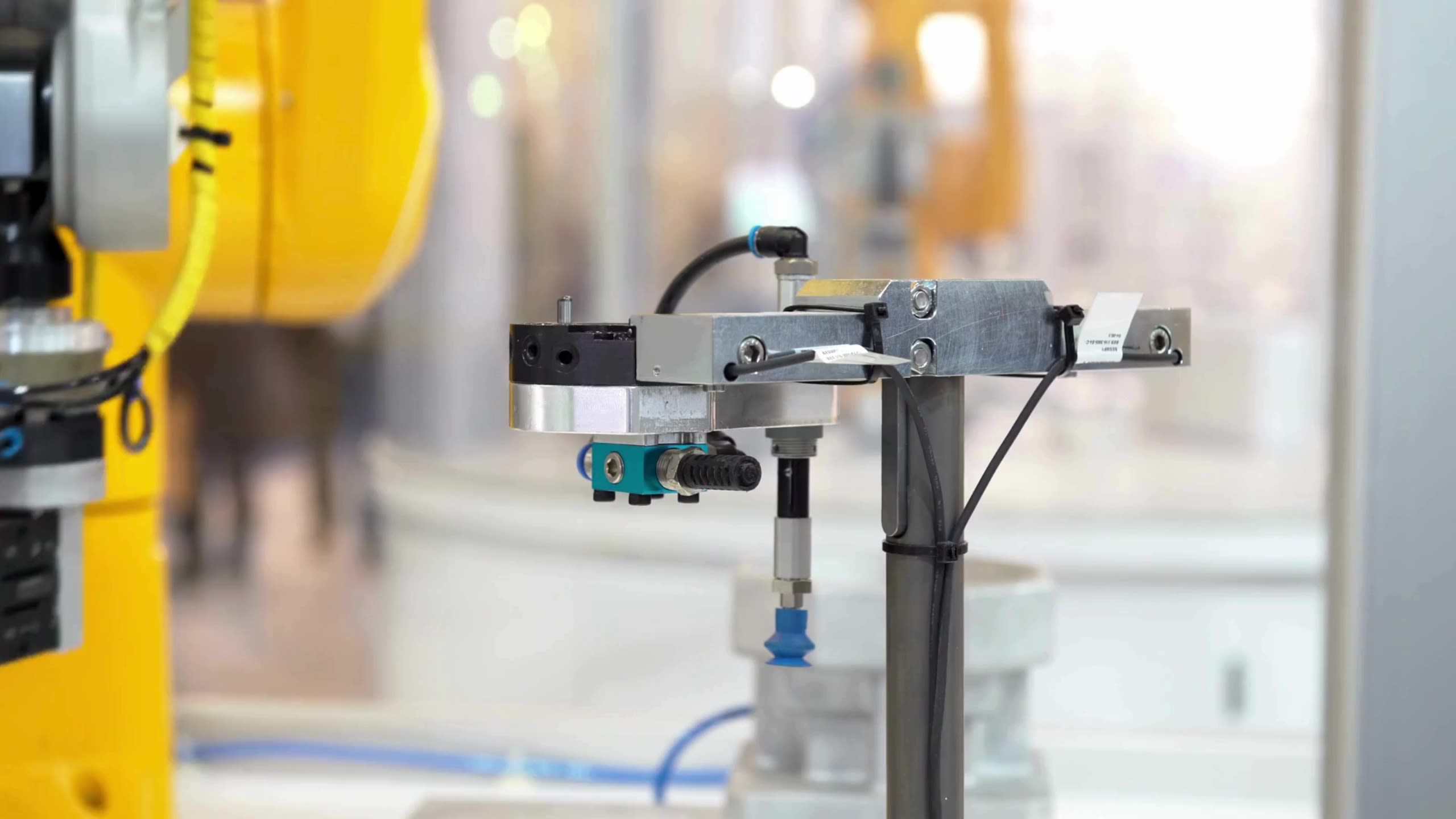
A hub for innovation.
The new capabilities that AI offers is constantly inspiring new start-ups and ventures. Oxford students who have an idea for a business or social enterprise have access to a comprehensive range of resources, including start-up incubators, innovation challenges and competitions, training programmes and unique funding opportunities. Many of these activities are coordinated through EnSpire Oxford, the University’s dedicated entrepreneurship hub.
Having created more than 300 new companies since 1988, Oxford is ranked first in the UK for university spinouts. This means that the University’s research commercialisation arm, Oxford University Innovation, can offer students uniquely excellent support for commercialising innovative ideas.
For instance, whilst undertaking his DPhil in the University of Oxford’s Division of Cardiovascular Medicine, Dr Ross Upton realised that applying AI to echocardiography could deliver step-change capabilities in the early detection of cardiovascular disease.
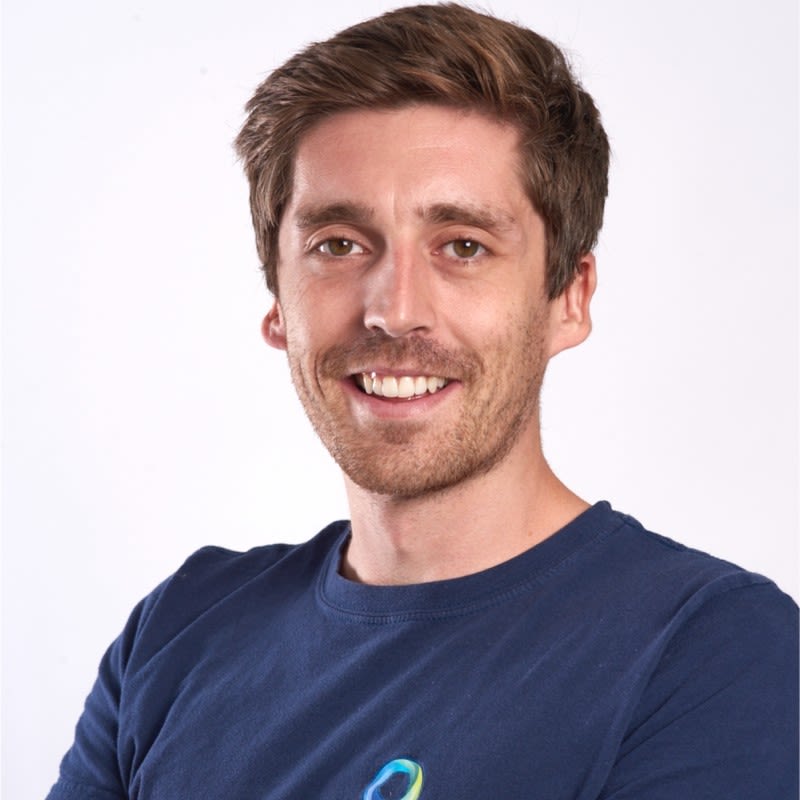
Dr Ross Upton
Dr Ross Upton
‘Certain cardiovascular disease can be extremely difficult to detect and when missed, can lead to severe consequences’ he says. ‘Throughout my DPhil at Oxford, our lab group demonstrated that AI could improve the accuracy of disease detection from an echocardiogram to a level significantly better than the standard achieved by clinicians.’
‘It was clear that commercialising this research would lead to a much faster translation into health services. Together, with Professor Paul Leeson (my DPhil supervisor), we worked with Oxford University Innovation who helped fund the first prototype build of the software, and to file the initial patent.’
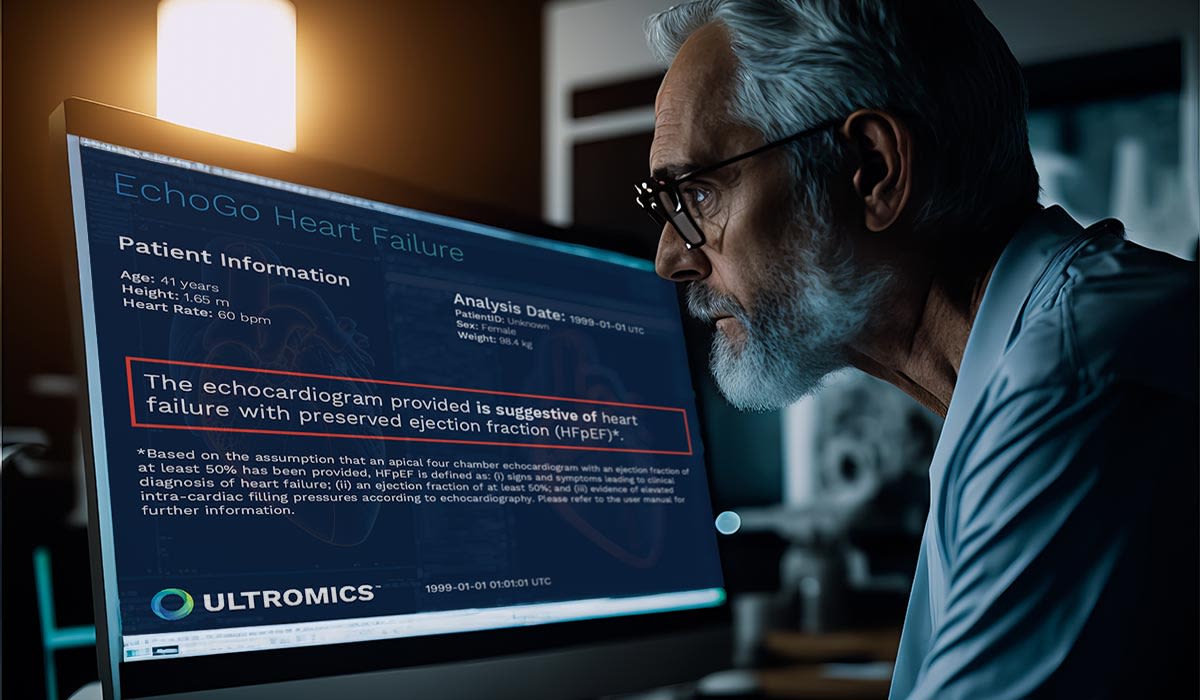
Clinician viewing report sent by Ultromics’ EchoGo Heart Failure. Credit: Ultromics.
Clinician viewing report sent by Ultromics’ EchoGo Heart Failure. Credit: Ultromics.
This resulted in Dr Upton and Professor Leeson co-founding the spin-out company Ultromics in 2017. The company’s product, EchoGo, can improve the detection of multiple cardiovascular diseases from an echocardiogram to above 90% accuracy from a single view, and is currently being used in UK and US hospitals.
‘Getting involved with entrepreneurship during my DPhil was a highly valuable experience.’
‘We had to think about how to apply our research to a clinical setting, it wasn’t all about publishing papers’ Dr Upton says. ‘When running a company, you realise that your research has to be both distinct enough from the competition and has to deliver tremendous value to patients and health systems. Therefore, entrepreneurship prohibits you from conducting incremental research: generally, your research has to be transformative, for it to be commercially scalable.’

Tailored support for policy engagement.
Policy makers are not generally specialists in AI, yet it will be up to them to develop frameworks for these technologies to be used ethically and safely. This makes it crucial that AI researchers engage with policy – and it is never too early to start. At Oxford University, there is a wealth of support for researchers to communicate their work to policy audiences, including for DPhils and early-career researchers.
The Oxford Policy Engagement Network (OPEN) connects researchers across the University with opportunities to engage with the policymaking community locally, nationally and internationally. This includes internal and external training, signposting to funding, networking events, and a peer-mentoring scheme with the UK Civil Service Policy Profession Unit.
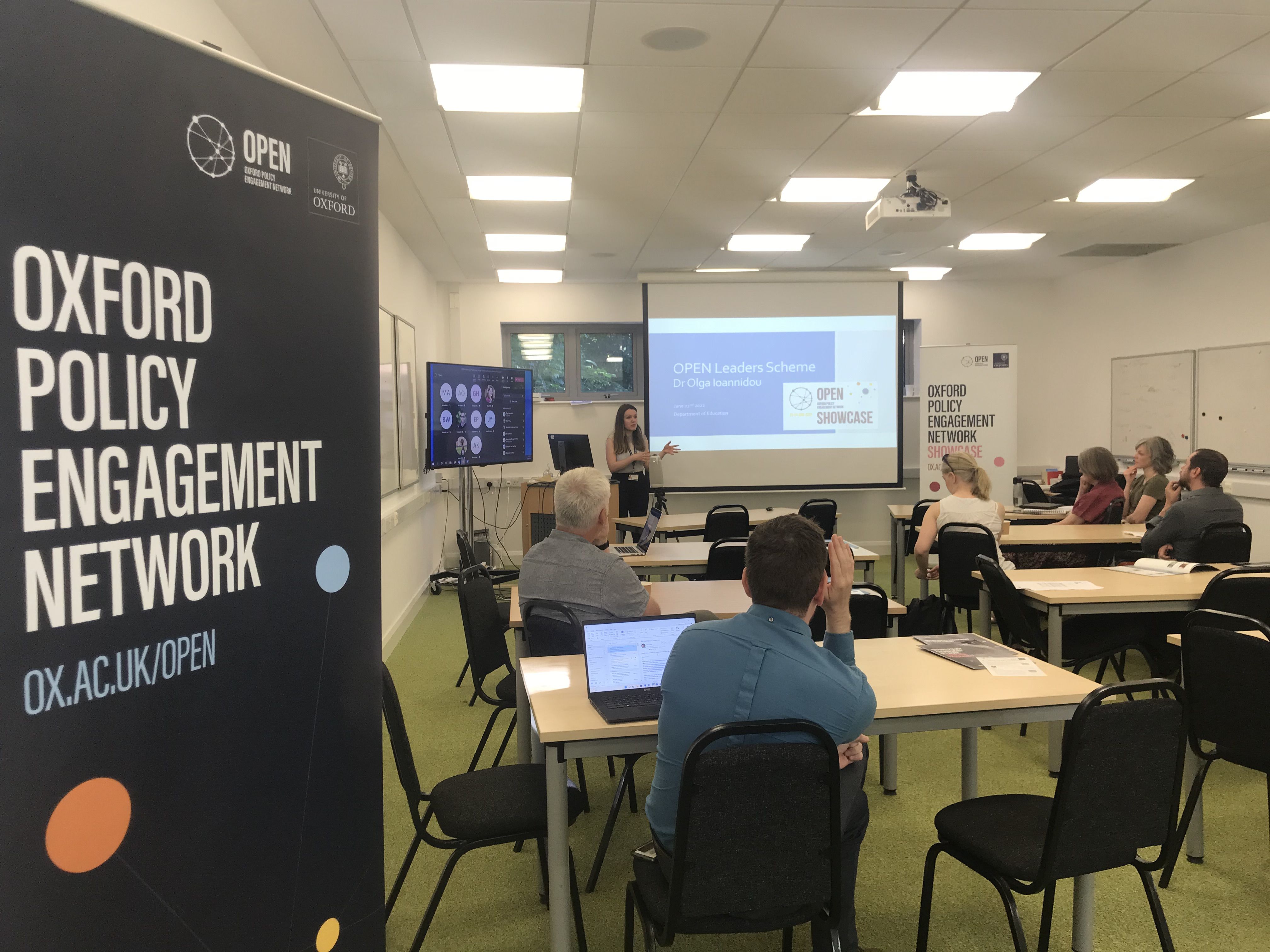
An event organised by the Oxford Policy Engagement Network (OPEN).
An event organised by the Oxford Policy Engagement Network (OPEN).
For instance, through OPEN, former Oxford DPhil student Michael Cohen identified an opportunity to present his research on AI safety directly to Members of the House of Commons Science and Technology Select Committee.
‘My DPhil thesis concerned using theoretical Bayesian statistics as a tool to develop frameworks for using advanced artificial reasoning safely’ he says. ‘This highlighted a very real existential threat posed by reward-based reinforcement AI learning models. We published the findings as a scientific paper, but I was unsure how to communicate the key messages to policy makers.’
‘I happened to hear about a workshop specially about engaging policy makers with AI research, which OPEN was organising. This gave a really clear overview of the various ways that research evidence can inform policy making, many of which I wasn’t even aware of. It also directed me to a current Parliamentary inquiry related to Governance of AI.’
‘I worked with my supervisor Professor Michael Osborne on a submission, which made several policy recommendations based on my work. We were both subsequently invited to present our work in person to the Science and Technology Committee. It was very exciting to go to Parliament itself, and the Committee seemed really receptive to what we had to say. When the final report for the inquiry was published, it was very satisfying to see our research quoted. It was clear that our testimony had influenced the final recommendations.’
‘If we want policy makers to design sound policies, then it is essential that the people who best understand the issues give their input. If researchers can translate the key messages effectively, we have a much better chance of having good, targeted regulation.’
‘Given that I intend to have a long-term career in AI safety, the experience gave me a head start in making sure my work has impacts in the policy arena. I now have much greater insight in how to communicate my work to address policy makers’ needs, and I am definitely keen to do more.’

Addressing key skills gaps.
As AI becomes increasingly incorporated into industry, research and society, this is creating an urgent need for computer scientists with complementary skills and knowledge. The exponential growth of these technologies is opening up a whole range of exciting new jobs – but a key challenge for many sectors is a shortage of candidates with the right skillset.
Oxford University is proactively addressing these shortages, through offering a constantly evolving portfolio of strategic training schemes. In particular, Oxford’s Doctoral Training Programmes (DTP) and Centres for Doctoral Training (CDT) have a strong focus on interdisciplinary work to address specific research challenges. These provide structured training and research experience in the first year, and a research project leading to a DPhil in subsequent years.
In October this year, Oxford University launched a new Centre for Doctoral Training, The Intelligent Earth Centre. The aim of this is to train a new cohort of DPhil students to be able to develop and apply cutting-edge AI technologies to tackle urgent environmental crises, including climate change, biodiversity loss and clean energy.
‘Intelligent Earth will train a new generation of DPhil students to tackle some of the most pressing environmental issues using AI, directly addressing a critical training need. It is just one example of how Oxford is helping to meet crucial skills gaps at the frontiers of new technologies.’
‘The remarkable breakthroughs in AI and machine learning over recent decades could revolutionise environmental research and provide novel solutions to address Earth’s environmental crises, however, this is currently restricted by a crucial skills gap’ says Professor Philip Stier, Director of the Intelligent Earth CDT. ‘Environmental scientists often lack expertise in data sciences, limiting their ability to leverage AI and machine learning tools, whereas data scientists typically do not have specific knowledge in environmental sciences.’
‘The Intelligent Earth CDT will meet this need by delivering a multidisciplinary training program at the interface between the environment and AI. Not only will this provide highly qualified graduates for a wide range of industries, but we also expect our students to drive innovation and found their own start-ups, supported by the programme’s dedicated training in enterprise, impact and responsible AI.’

The Intelligent Earth Centre will train a new generation of DPhil students to develop and apply cutting-edge AI technologies to tackle urgent environmental crises. Image credit: Philip Stier, NASA satellite imagery.
The Intelligent Earth Centre will train a new generation of DPhil students to develop and apply cutting-edge AI technologies to tackle urgent environmental crises. Image credit: Philip Stier, NASA satellite imagery.
Like all Oxford’s CDTs, The Intelligent Earth Centre will be intrinsically interdisciplinary, delivering tailored training and facilitating ambitious, intersectoral projects. Following a rigorous taught programme covering AI tools, frameworks, and environmental datasets, students will work in interdisciplinary groups to tackle grand challenges in environmental science with increasing complexity. The program’s wide range of wide range of industry partners (including IBM, Google, DeepMind, NVIDIA, and the European Space Agency) will host the Centre’s students for placements, enabling them to develop their skills further.

An inclusive, supportive environment.
Oxford’s top-class facilities, strong industry links and support for innovation all support an excellent research environment. But ultimately, it is the people and the diverse community that make Oxford the ideal place to launch a career in AI.
As Olivia says, this community creates a highly stimulating learning environment. ‘The AI community is very active at Oxford, with people working on everything from computer vision to self-driving cars to theoretical machine learning’ she says. ‘As students, you have the opportunity to learn about everything going on through the huge number of interesting seminars that happen every week at the different departments or as part of a specific program like the Schmidt AI fellowship.’
There is a particularly strong community of women and gender minorities in computer science, as Kelsey says. She is currently the president of the Oxford Womxn in Computer Science group (OxWoCS) which works to support and empower women and gender minorities to make an impact on computer science. ‘There is a really strong, inclusive community of women in computer science at Oxford, and OxWoCS now has over 250 members from various Departments. We host departmental lunches, seminars, industry dinners, co-working sessions, and a joint annual conference with Cambridge. It makes such a difference having a supportive community you can lean on, and I have made lifelong friends through the society.’
More on #OxfordAI


